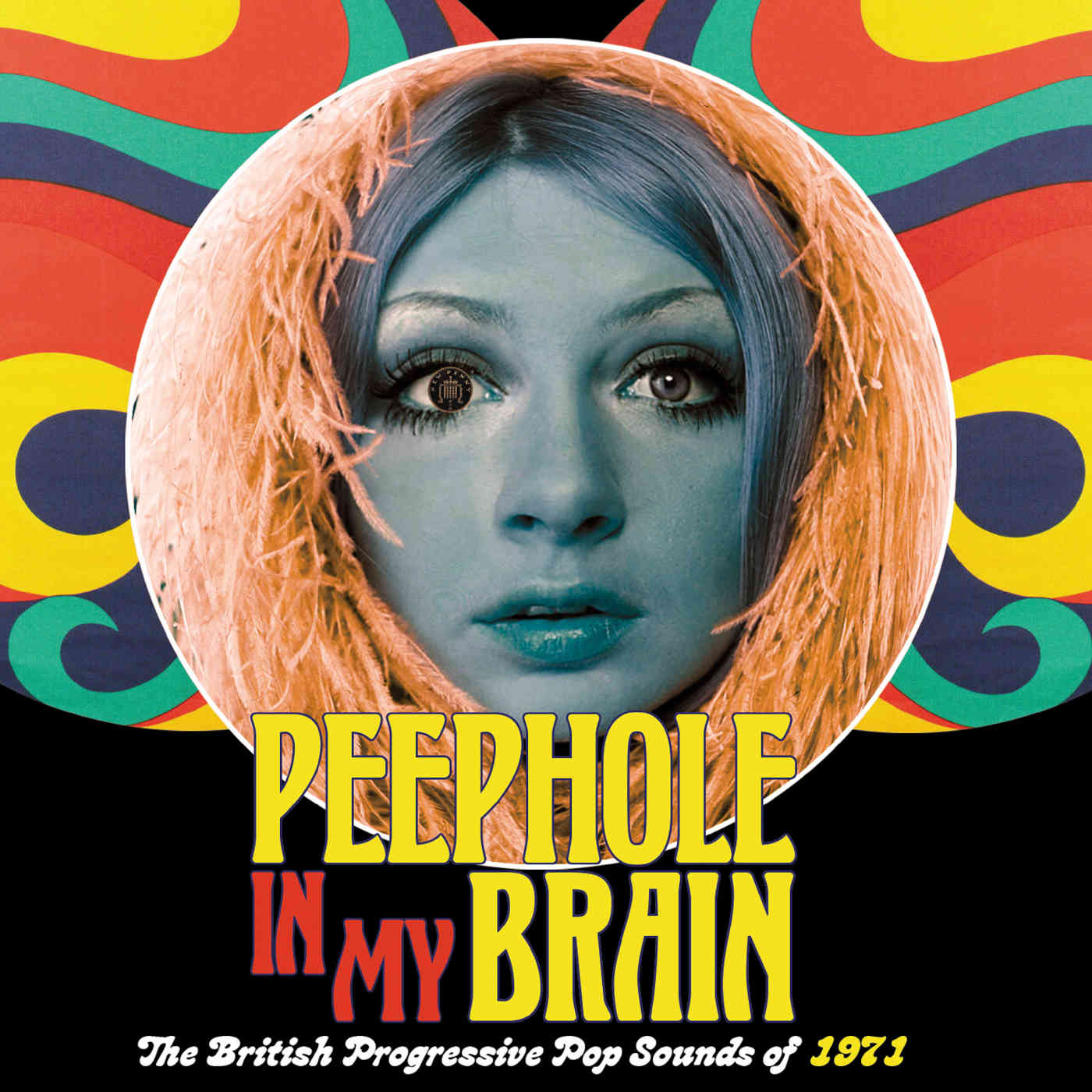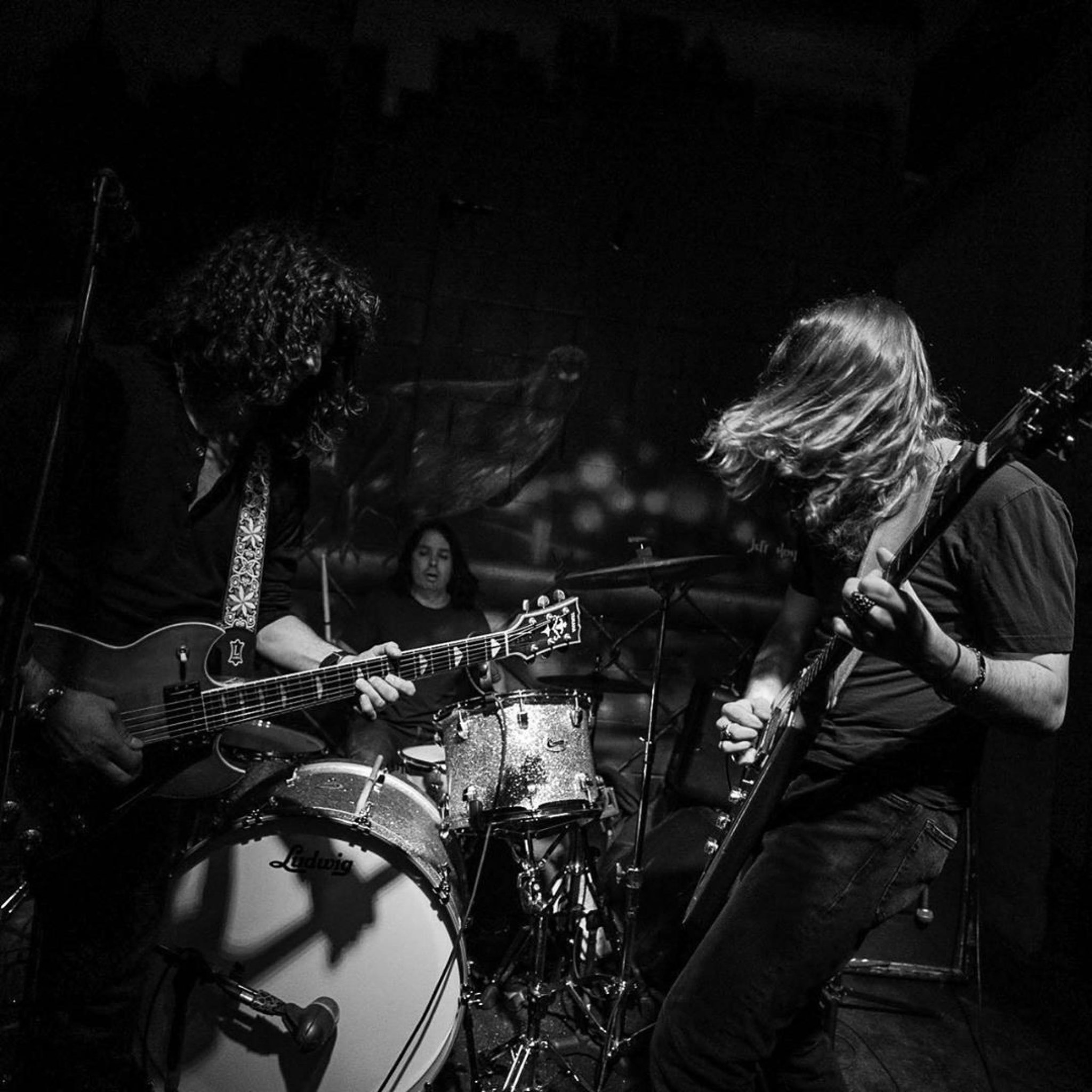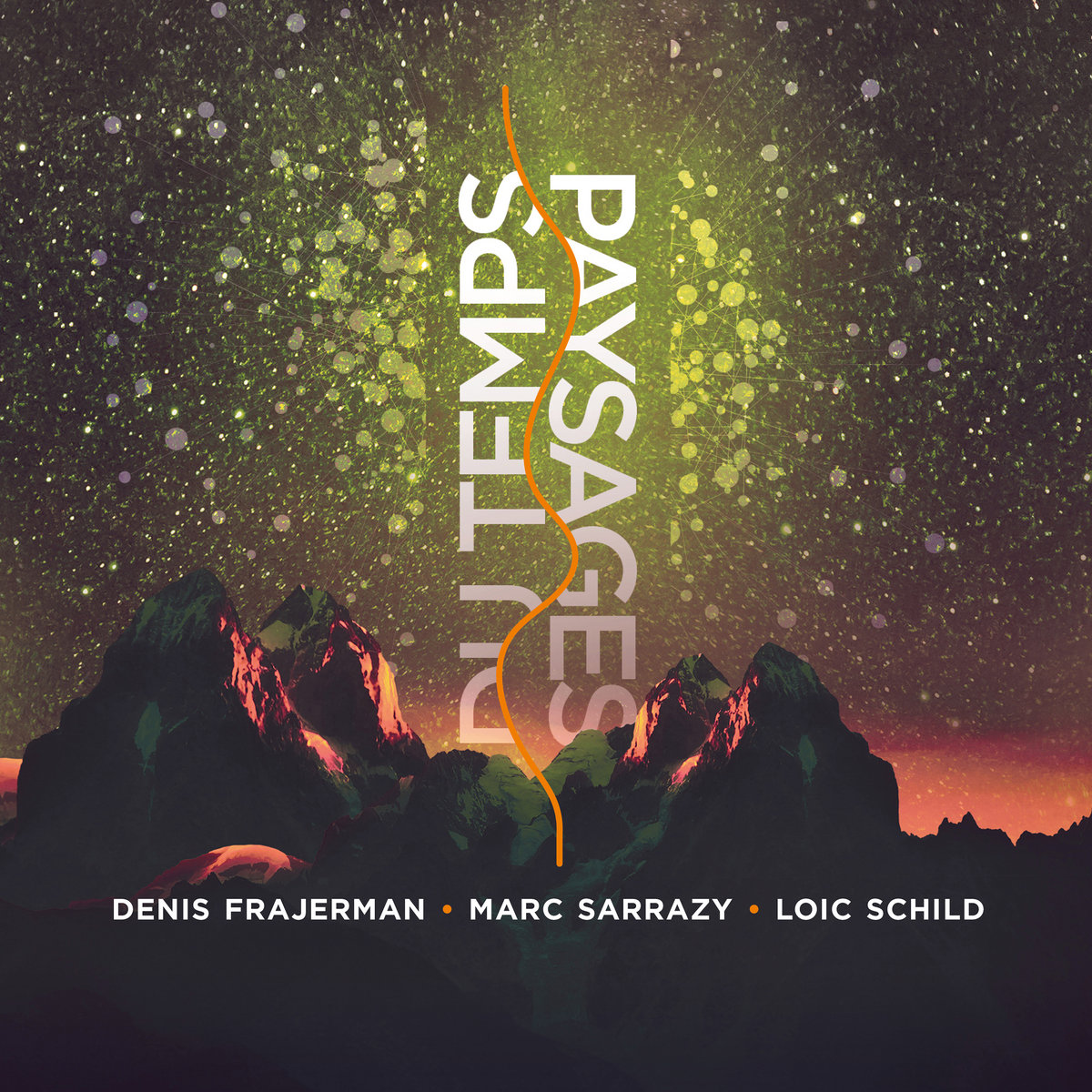‘Peephole In My Brain- The British Progressive Pop Sounds Of 1971’
“The whole pop scene is obviously a cyclical thing,” John Peel said in April 1971, “where you get these great spurts of action, then it dies down again, then, whooomph, off it goes.”
“I think it must be fairly close- the next phase that’s going to suddenly sweep the world by storm. It must be just around the corner.”
And yet, as 1971 dawned, those anticipating that elusive “next phase” must have felt they were waiting for Godot. Was this, as Hunter S. Thompson pondered during that uneasy transitional year, the wretched denouement of a “Main Era—the kind of peak that never comes again”?
In the U.K, Jimi Hendrix’ ‘Voodoo Chile,’ a posthumous chart topper for the late guitar legend, sloped further and further down the charts as the purple haze of the late 1960s continued to disperse.
All the while, a maudlin 1970s smog gathered grimly in its place. 51-year-old ‘Dad’s Army’ star, Clive Dunn, dominated the radio airwaves with his plodding novelty number one hit ‘Grandad,’ a sickly-sweet record nauseating in its penny-farthing-children’s-choir saccharinity.
Furthermore, the pirate radio stations that had offered a fast-paced, Carnabetian soundtrack for the proto-hippie dandies and dollybirds of the middle 1960s were a distant memory. ‘Top of the Pops’ may have been approaching its peak in 1971, but the grotesque sight of Jimmy Savile donning a gimp mask and leering at the young women in the studio audience can only have served as an early indication that the 1970s were sure to be a challenge for taste.
Mothers, the Birmingham club that had since 1968 hosted the crème of the underground scene- the likes of Family, Soft Machine and Quintessence, to name but a few- followed closely in the footsteps of the defunct Middle Earth club, closing its doors early in the year. So too did San Francisco’s legendary Fillmore West.
And when Rolling Stone magazine interviewed Syd Barrett in 1971, they found a wilted flowerin place of the acid-eating gnomic madcap who, with his ruffled shirts, crushed velvet trousers and mirrored guitar, had once embodied the fleeting euphoric ethos of the nascent London underground scene back in 1966-67.
“I’m disappearing,” said the dark-eyed former Pink Floyd frontman, “avoiding most things… I’m treading the backward path. Mostly, I just waste my time.”
Meanwhile, the Beatles continued to supernova under the full gaze of the press. The case for the official dissolution of their contractual partnership opened in the High Court on January 19th, and the highly publicised and increasingly acrimonious inter-band mudslinging that accompanied the proceedings led LIFE Magazine to dub the Fab Four’s implosion the ‘Beatledämmerung.’
As the patron saints of the 1960s spiritus mundi publicly sought to snatch each other from their respective pedestals, they unintentionally mirrored the reality of a music world splintering into dozens of irreconcilable pieces.
John grew increasingly politically radicalised as Paul took refuge in the heart of the country. George attempted to assuage the bitterness of the new decade with his earnest gospel-folk anthem, ‘My Sweet Lord,’ whilst Ringo gingerly expressed how he wanted to “see all three” return to performing with him on the B-side of ‘It Don’t Come Easy,’ ‘Early 1970.’
Even if redemptive flashes of brilliance could be found on the album charts- with epochal releases from the Who, Carole King, Led Zeppelin, the Rolling Stones and the Doors- that revolutionary ‘something’ that had permeated the air in the distant summer of 1969 was dissipating.
And, if anyone was in need of yet another omen that the spinning wheels of time were turning, the very currency itself changed, switching over to decimal on February 15th.
Yet, the front-runners of the “next phase” were gathering at the wings awaiting their cue. The musical prognosis may have appeared bleak on the singles chart, but the shape of things to come was already being presaged if one knew where to look.
The recently electrified T-Rex lurched from the marijuana smoke of the underground and found their feet with a number 2 hit, ‘Ride A White Swan.’ With its simple, spiked, rockabilly-inspired riff and pseudo-mystical lyrics, it sounded little like the other records that cluttered the pop charts. When follow-up single ‘Hot Love’ struck the upper echelons of the Top 10 a few months later, elven lead singer Marc Bolan opted to don satin stage wear and glitter makeup for the band’s appearance on ‘Top of the Pops’. ‘Hot Love’ became T. Rex’ first chart topper, and glam rock- the genre that would go on to dominate the British airwaves in the early 1970s- was born.
Another of the leading lights of the decade was to re-emerge from obscurity in 1971, rising from the embers of one of the Aquarian Age’s most spiritual- and final- great Be-Ins.
In the shadow of Glastonbury Tor of Arthurian legend, 12,000 seekers gathered on the ley lines to welcome in the Summer Solstice with a beatific free festival. Daevid Allen’s Gong, Traffic, Skin Alley and Terry Reid were but a handful of the British acts that shared the first Pyramid Stage with American cousins Melanie and Joan Baez.
“Ten thousand sighs turned on a hot day yesterday,” wrote Andrew Kerr in his dispatches from the 24th of June, 1971. “Some cases of sunburn came up. It’s a young year and a younger decade. Wear a hat made of happy thoughts.”
“People are asking when the Fair ends. It ends like a circle ends. Take it with you, the sounds, the smiles, the lights and the scene. It isn’t just an experience, is it? It’s a….a… (you name it, it was probably IT).
“T.V Interviewer to individual: ‘How many Organisers are there? Answer: ‘Twelve thousand and one.”
“End of bulletin. The beginning of the World.”
On the dawn of June 23rd, a relatively unknown folk singer, resplendent with long hair, floppy wide-brimmed hat and blue magician’s cloak, took to the stage.
He played older songs from his canon that seemed tailor-made for the Glastonbury Fayre- for instance, a song called ‘Memory of a Free Festival’- alongside newer material that would, one day, be considered anthemic. When joined onstage by a tripping Scandinavian woman intent on providing backing vocals, he laughed and said, “She’s here!” and invited her to sit by his piano.
The new wave was sprouting from the scattered brown leaves of flower power’s autumn months.
“Look out at your children
See their faces in golden rays
Don’t kid yourselfthey belong to you
They’re the start of the coming race…”
“People were waking up in their sleeping bags having been frozen all night in the mud,” remembered Dana Gillespie, an old friend of David Bowie, the troubadour winning hearts and minds on the pyramid stage.Hitherto known only for his 1969 hit, ‘Space Oddity,’ Bowie’s career was mere seconds from lift-off.
“It was quite extraordinary. He didn’t have a full audience in attendance, but the ones he did have, he completely won over.”
The following month, Gillespie took to the studio to record a song Bowie had penned with her in mind.
“Put a peephole in my brain
Two New Pence to have a go
I’d like to be a gallery
Put you all inside my show…”
“He said he’d written a song for me,” she recalled. “That song turned out to be ‘Andy Warhol.”
“I often wondered why he thought it was suitable for me, because it was so completely abstract- very different to my own songwriting. I was always very uncomfortable with the song, to be honest.
And I had no interest in Warhol- I certainly didn’t want a painting of a tin of soup hanging on my wall.”
“Anyway,” she said, “I recorded it with the band that became the Spiders, with Mick Ronson on lead guitar. But Bowie decided he liked the song, and he then recorded his own version for ‘Hunky Dory.”
It is Dana Gillespie’s spirited rendition of ‘Andy Warhol’ that opens Grapefruit Record’s ‘Peephole In My Brain- The British Progressive Pop Sounds Of 1971,’ a brand new 3CD box set that aims to lift the lid on a year often overlooked by crate diggers in favour of what came before and what was yet to come.
The latest in the label’s acclaimed series focusing chronologically upon the British pop scene of the late 1960s and early 1970s, ‘Peephole In My Brain’ follows proudly in the footsteps of its predecessors, once again championing the forgotten and the obscure whilst, most importantly, proving a very entertaining and informative listen. Grapefruit Records are rightfully revered for the almost paleontological fervour they exhibit when assembling their tracklists, not to mention their reverence in remastering the material they unearth.
And given the unusual nature of the year in question, they have succeeded in uprooting some particularly strange fruits.
After all, as David Wells writes in the lavish accompanying 40-page booklet, 1971 was the year in which “Jonathan King appeared on Top of the Pops with Fairport Convention as his backing band, and Mungo Jerry dislodged the tender devotional ‘My Sweet Lord’ from the top spot with the Lolita-referencing rape fantasy ‘Baby Jump.”
“Elsewhere, David Bowie wore a dress on the cover of his latest album, the Kinks provided the soundtrack for a film about a penis transplant, and Cliff Richard grew a beard.”
Fans of the era will, of course, recognise a handful of the collated artists and recordings. The box set, whilst certainly esoteric, does not aim to be impenetrable to the casual fan and as such doesn’t shy from including successful recordings where pertinent. To this end, ‘Peephole in My Brain’ includes ‘Back Street Luv’-Curved Air’s slinking summertime hit- not to mention the heavy Atomic Rooster workout ‘Devil’s Answer’ and John Kongo’s hard-charging ‘Tokoloshe Man.’
Those who have been following the previous instalments of this excellent Grapefruit series will also be familiar with artists and groups featured in prior box sets-Octopus, Lifeblud, Cliff Wade, Airbus- who rub shoulders once again with long established underground and progressive favourites such as Nirvana, Procol Harum and Kevin Ayers.
Also compiled are songs that originated in 1971 but would have to wait for chart success. ‘Mean Girl’, a top 20 hit for Status Quo in 1973, is represented by a raw originally unissued mix, whilst ‘Sea Side Shuffle’ by Terry Dactyl & the Dinosaurs- in actuality Brett Marvin & the Thunderbolts operating under a blatantly T-Rex-inspired moniker- would strike gold the following summer, kept off the number one spot by Alice Cooper’s ‘School’s Out.’ (When follow-up Terry Dactyl singles failed to replicate this success, ‘Sea Side Shuffle’ songwriter John Lewis left the group to embark upon his solo career as Jona Lewie.) Meanwhile, Curtiss Maldoon would have to wait twenty years for his belated lease of prominence, when his 1971 album track ‘Sepheryn’ (featured in the box set) was utilised by Madonna as the basis of her 1998 international hit, ‘Ray of Light.’
The underground’s flirtation with the mainstream- and vice versa- stands as something of a recurrent motif throughout the set. The low-key lazy haze of Medicine Head’s ‘And The Pictures In The Sky’- originally released on John Peel’s Dandelion label and featured on Disc 3- proved a surprise Top 30 hit in July, and the darlings of the freak scene, the Edgar Broughton Band, accrued an unlikely admirer with the release of their wearisome wanderer’s ballad, the outlaw-inflected ‘Hotel Room.’ DJ Tony Blackburn, housewives’ favourite and antithesis of all things counterculture, selected the song- featured on the first disc- as his ‘Record of the Week.’
Edgar Broughton recalled him saying that “he hated everything that we stood for, but that the single was the best thing he had heard that year.”
This being a collection of turn of the decade progressive pop, the breadth and range of lyrical topic matter is characteristically diverse. Stackridge regale us with the tale of ‘Dora the Female Explorer,’ Wishful Thinking offer a brooding atomic age rumination with the atmospheric ‘Hiroshima,’ Deep Feeling sympathetically depict life in an old people’s home, and the Kinks reflect nature and over-industrialisation in ‘God’s Children,’ an Edenic ballad wasted through it’s inclusion in the ribald penis-transplant farce film, ‘Percy.’“Lola’ had become a worldwide hit,” Ray Davies said in 2008, “but what did my clever management do? For a fee of a few thousand pounds, I think, they encouraged us to do the ‘Percy’ soundtrack rather than rebuild our career in the States.”
This eclecticism is further noticeable in the wildly varied musical stylings of the featured material; this is progressive music with a capital P, free of pretension and often surprisingly melodic. Several counterculturally-inclined turn of the decade subgenres intersect over the course of the set- from the euphoric hippie sunshine pop of Rick Price’s ‘Talking to the Flowers,’ the mellotron-drenched sentimentality of Stray’s ‘Dearest Eloise’ and the harmonic lo-fi diamond-in-the-rough Factory gem ‘Castle on the Hill,’ through to the proto-glam of the Hollies surging ‘Hey Wily,’ the muscular pop-rock of Fields’ ‘While the Sun Still Shines,’ Sakkarin’s tongue-in-cheek hard rock parody of Archies bubblegum smash ‘Sugar Sugar’ and the stripped back, rootsy ‘Turning Green’ courtesy of Jackie McAuley, ‘Peephole in My Brain’expertly traces-and embraces- the musical cadences of a very odd year.

‘Peephole In My Brain- The British Progressive Pop Sounds Of 1971’ is a fantastic, fascinating facsimile of post-psychedelic British pop in the full throes of reinvention, full of excellent music and paired, as ever, with a well-written and researched booklet. It can only be hoped that a 1972 retrospective will follow next year so that British pop’s transmogrification can be charted even further.
What costumes shall they wear to all tomorrow’s parties?
The jury is still out as to 1971’s stature in the wider pop cultural pantheon- was it, in the words of John Peel, a “very sterile period,” or was David Hepworth correct in asserting it as the “most febrile and creative time in the entire history of popular music?”
It’s entirely subjective, but the contents of this set certainly lend some credibility and weight to the claims of the latter.
– Jack Hopkin
Peephole In My Brain – The British Progressive Pop Sounds Of 1971, Various Artists, 3CD (Grapefruit Records, 2020)
Plastic Penny – ‘Everything I Am: The Complete Plastic Penny’ (2019)
‘Love, Poetry and Revolution: A Journey Through the British Psychedelic And Underground Scenes’



